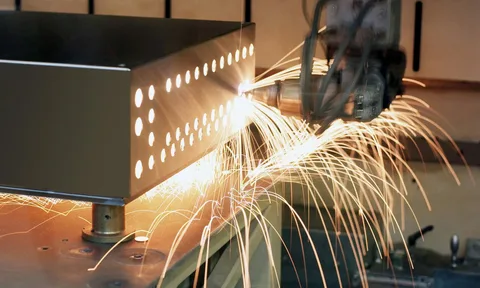Construction and manufacturing industries in Dubai are in full swing and the demand for good custom metal fabrication Dubai services has never been greater. Regardless of whether you are undertaking a residential project, commercial development, or an industrial installation process, the choice to get the right metal fabrication partner can either make or break the success of your project. The complex market of the emirate is very extensive in terms of opportunities, though it is important to go through it, selecting and planning deliberately. In this article, you will go through all the relevant considerations that distinguish the best you can find to consider using in your fabrication work and the average fabricator.
1.Understanding Your Project Requirements before You Begin
The most fundamental tip to an effective metal fabrication project is to ensure that you have laid out your individual requirements and expectations. Begin by writing down the precise details of what you need in terms of a project in terms of specifications of the dimensions, materials, finish as well as you have planned applications. Check what you require for structural sections, decorative sections, machine parts, or architecture. The complexity level can assist the industrial sector in identifying which fabricators possess the desired skills and machinery to undertake your job. You should also analyze the schedule of the project, its financial issues, and quality requirements.
2.Evaluating Experience and Industry Expertise
There is nothing like experience in the metal fabrication business where technical skills and practical expertise are acquired through years of work with a variety of assignments. Identify fabricators that have a record of accomplishment of undertaking a similar project compared to yours in regards to its size and complexity, lacking any barrier to industry demands. Skilled professionals are aware of the peculiarities of various metals, welding processes, and finishing operations that may largely affect the result of your project. They also hold on problem solving skills which they have gained over the years in the process of defeating fabrication challenges. Go through their portfolio with keen interest noting the range and quality of their works accomplished. Enquire on the qualification and certifications of their team as well as their continuing training.
3.Assessing Technical Capabilities and Equipment Standards
The modern metal fabrication industry needs advanced machines and technical proficiency to provide the precision results within a short duration of time. Investigate the machinery available in the fabricator; cutting machines, welding machines, forming machines, and finishing machines. The newer ones are normally designed with computer controlled machines that help in accuracy and consistency of production runs. Also, evaluate their ability to work on the magnitude of your project with regard to available capacity to deliver quality without pushing the deadlines overboard. Good fabricators take the time to invest in replacement of the fabrication equipment and also in maintaining optimum working conditions.
4.Verifying Quality Standards and Certification Requirements
In metal fabrication quality management applies several levels of standards, certification and inspection procedures, so that the end product is able to meet the requirements. Respectable fabricators have known quality management systems like ISO certifications that mean that they are keen on delivering quality. Ask them about their quality control process such as testing of materials, checking of its dimension and the level of weld. Their quality documentation and traceability approach is important to understand, more so to projects that may need compliance to certain industry standards or regulatory norms. And make sure that their welding workers are certified to your project specs as well.
5.Analyzing Cost Structures and Value Propositions
Cost analysis in custom metal fabrication does not only involve mere comparisons of prices as it involves other factors of the value, quality and success factors of the jobs in the long run. Insist on broken quotes where material cost, labour charges, use of equipment and delivery, and finishing are separately charged. Clear prices reflect the professional nature and enable you to realize in which direction your money is spent. Avoid any prices offered that appear to be so much cheaper than the others because this may mean poor quality, cost fixing or unrealistic projections. The expense of ownership should be considered not only the initial price, but also the maintenance requirements, the durability expectations, and the possibility of getting a warranty cover.
6.Examining Communication Skills and Project Management Approach
Communication is the core element of successful fabrication projects and it helps all parties to be on the same plane during the process of production. Analyze the responsiveness as well as the clarity of your initial questions to potential fabricators and their knowledge on your needs. Relevant questions are asked by the professional fabricators to make the specifications more understandable and they explain in detail their strategy and their way to answer. Evaluate their project management issues, such as schedules systems, tracking of progress and change management processes. Effective communication eliminates confusion hence ensuring delay or costly changes.
7.Reviewing Previous Client Feedback and References
References and testimonials of former and current clients will give you priceless information about the reliability and quality delivery of a fabricator as well as the standards of customer service that you cannot get by looking at the promotional literature they send you. Ask the references of the recent projects closely related to yours and take your time to get in touch with these customers directly. Pose definite questions regarding the consistency with timeline, satisfaction levels with quality delivery, issue solving, and general cooperation experience. Industry rating and online reviews may be a complement to direct references but concentrate on extended reviews and feedback instead of mere stars.
Conclusion
After a critical consideration of all these, compile your findings and make a good choice of metal fabrication services that suits you based on quality, cost, reliability and compatibility with the project specifications. Prepare a comparison matrix of the key criteria to be considered, including expertise, abilities, price, quality of communication and references. Evaluate both quantitative attributes such as qualifications and costs with more qualitative ones such as cultural matching and communication approach.


